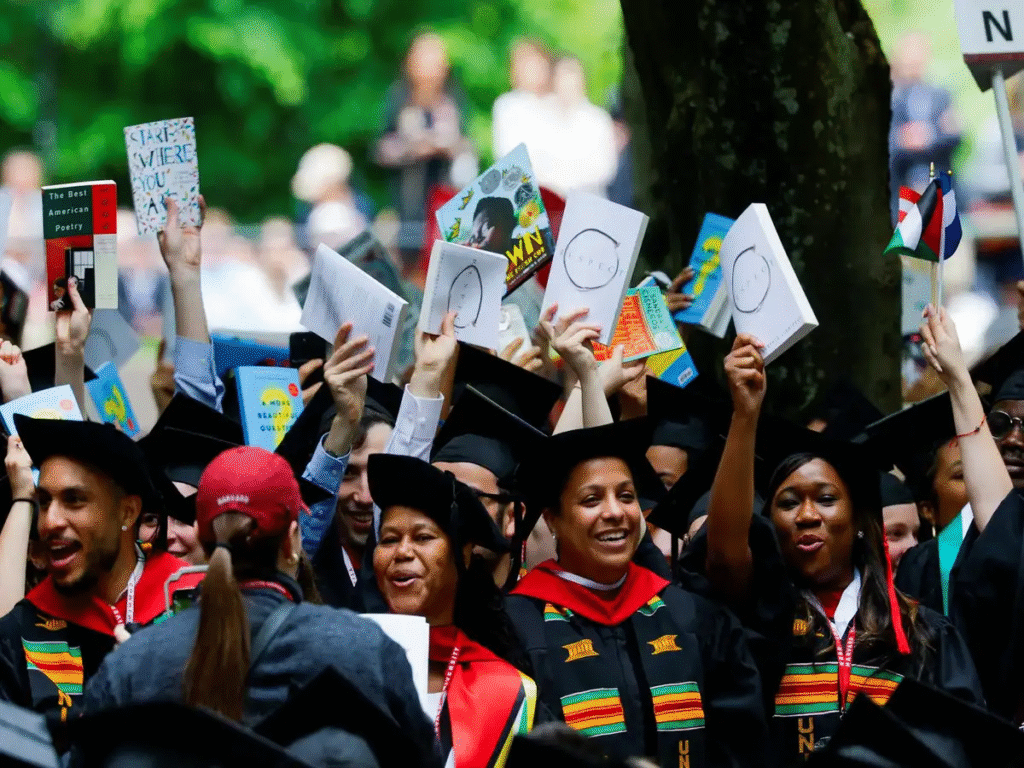Trump Signs Proclamation Halting Visas for New Harvard International Students Amid Ongoing Legal Clash
In a major escalation of its campaign against elite academic institutions, the Trump administration announced Wednesday that President Donald Trump has signed a proclamation suspending the issuance of visas to new international students seeking to enroll at Harvard University. The measure throws the future of thousands of foreign students into uncertainty and marks the latest flashpoint in a legal and political standoff between the White House and the Ivy League institution.
The move comes just days after a federal judge blocked an earlier attempt by the administration to restrict Harvard’s ability to enroll international students. Roughly 27% of Harvard’s student body comes from outside the United States, making the proclamation a potentially devastating blow to its academic makeup and financial structure.
“This is yet another illegal retaliatory step taken by the Administration in violation of Harvard’s First Amendment rights,” a university spokesperson said in a statement to CNN.
The White House defended the move as necessary to “safeguard national security,” accusing Harvard of maintaining “concerning foreign ties and radicalism.”
Officials also accused the university of failing to adequately address antisemitism on campus while continuing to emphasize diversity, equity, and inclusion (DEI) initiatives, which the administration has described as “racist.”
Though the order targets Harvard specifically, it exempts foreign nationals whose presence is deemed to be in the “national interest” and does not apply to international students attending other U.S. universities under the SEVP (Student and Exchange Visitor Program).
The proclamation is scheduled to remain in effect for six months, during which time the Attorney General and the Secretary of Homeland Security are expected to submit a recommendation on whether it should be extended.
This action follows a recent ruling from U.S. District Judge Allison Burroughs, who barred the Trump administration from modifying Harvard’s international visa privileges after a previous attempt to decertify the university’s participation in the SEVP program. That effort had stemmed from an order by Homeland Security Secretary Kristi Noem to revoke Harvard’s SEVP status, citing the school’s failure to provide requested conduct records for certain foreign students.
Harvard has maintained that the administration’s efforts violate both procedural and constitutional norms, claiming that the attempt to remove the school from the SEVP program is retaliatory in nature and stems from ideological opposition to its academic policies and campus culture.
For months, tensions between Harvard and the Trump administration have simmered as federal officials demand sweeping changes to the university’s programming, hiring practices, and admissions policies. The administration insists Harvard must take stronger measures to combat antisemitism and eliminate DEI policies that it views as discriminatory.

In a parallel move, the administration also targeted Columbia University this week, accusing it of failing to meet accreditation standards because of inadequate protection for Jewish students on campus.
The White House has taken a special interest in Harvard’s handling of foreign students and faculty, particularly those believed to have participated in recent campus protests related to the Israel-Hamas conflict. On March 31, administration officials sent a letter to the university announcing a comprehensive review of its contracts and grants—valued at approximately $9 billion.
In response, Harvard filed a lawsuit against the federal government after $2.2 billion in funding was frozen due to the university’s refusal to adopt policy changes demanded by the administration. Another $450 million in grants was later slashed, and the president has repeatedly threatened to revoke Harvard’s tax-exempt status.
Last week, the White House instructed all federal agencies to terminate any remaining contracts with Harvard, amounting to roughly $100 million in lost funding, according to two senior Trump administration officials.
Faculty and administrators at Harvard have expressed concern that the exclusion of foreign students could severely weaken not only the university’s global academic standing but also American academia at large.
For the 2024–2025 academic year, Harvard reported 6,793 international students and an international academic population of nearly 10,000. These students are crucial to Harvard’s funding model, as international enrollees are more likely to pay full tuition given their general ineligibility for U.S. federal financial aid.
According to the Institute of International Education, over 75% of international students fund their education independently or through family support, while fewer than 20% receive their primary funding from U.S. institutions. Their contributions provide a vital financial boost to colleges and universities across the country.
As the legal battle continues, Harvard’s future as a global academic hub remains in jeopardy, and the effects of the administration’s proclamation are expected to ripple across higher education, immigration policy, and international diplomacy.
